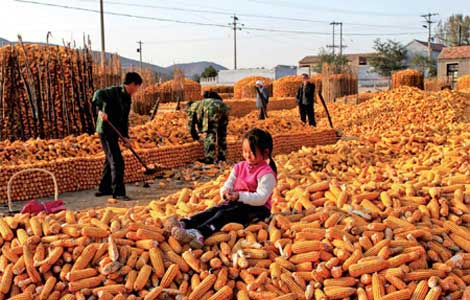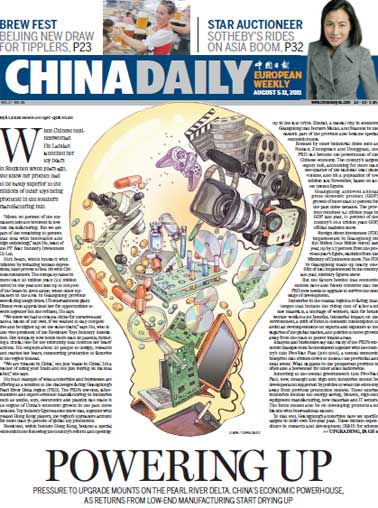Society
London burns: riots spread through UK capital city
Updated: 2011-08-09 10:08
(Agencies)
In the Peckham district of south London, where a building was set ablaze along with a bus - which was not carrying passengers - onlookers said the scene resembled a conflict zone. Cars were torched in nearby Lewisham, and shops looted in south London's Clapham district.
"There's been tension for a long time. The kids aren't happy. They hate the police," said Matthew Yeoland, a 43-year-old teacher watching the unrest in Peckham. "It's like a war zone and the police weren't doing anything. There were too many people and not enough police."
Duggan's death last Thursday stirred old animosities despite efforts by London police to build better relations with the city's ethnic communities after high profile cases of racism in recent decades.
Police say Duggan was shot dead when police from Operation Trident - the unit that investigates gun crime in the black community - stopped a cab he was riding in.
The Independent Police Complaints Commission, which is investigating the shooting, said a "non-police firearm" was recovered at the scene, and media reports said a bullet had been found in an officer's radio.
However, the Guardian newspaper reported that the bullet in the radio was police-issue, indicating Duggan may not have fired at the officer.
Duggan's partner, Semone Wilson, insisted Monday that her fiance was not connected to gang violence and urged police to offer more information about his death. But she said the riots appeared to be no longer linked to the initial protests. "It got out of hand. It's not connected to this any more. This is out of control," she said.
Many Tottenham residents claimed that the looting was the work of greedy youths - rather than fueled by anti-police sentiments.
"It's nothing to do with the man who was shot, is it?" said 37-year-old Marcia Simmons, who has lived in the diverse and gritty north London neighborhood all her life. "A lot of youths ... heard there was a protest and joined in. Others used it as an opportunity to kit themselves out, didn't they, with shoes and T-shirts and everything."
As the unrest spread, some pointed to rising social tensions in Britain as the government slashes 80 billion pounds ($130 billion) from public spending by 2015 to reduce the huge deficit, swollen after the country spent billions bailing out its foundering banks.
The past year has seen mass protests against the tripling of student tuition fees and cuts to public sector pensions. In November, December and March, small groups broke away from large marches in London to loot. In the most notorious episode, rioters attacked a Rolls-Royce carrying Prince Charles and his wife Camilla to a charity concert.
However, the full impact of spending cuts has yet to be felt and the unemployment rate is stable - although it highest among youth, especially in areas like Tottenham, Hackney and Croydon.
Some locals insisted that joblessness was not to blame. "We are going to get people blaming the economy and what happened last week, but that's not the real reason this happened," said Brixton resident Marilyn Moseley, 49. "It's just an excuse for the young ones to come and rob shops."
Godwin urged communities to help clear the streets of people, and called on families to contact their children and ensure that they were not involved in the chaos.
Home Secretary Theresa May, the Cabinet minister responsible for policing, and London Mayor Boris Johnson also cut short summer vacations in an attempt to deal with the crisis.
May said 215 people had been arrested and 27 charged so far, including an 11-year-old boy accused of burglary. About 100 of those arrested were 21 or younger and 35 police officers had been injured in the violence, police said.
Police in the city of Birmingham, 120 miles (195 kilometers) north of London, confirmed that officers had arrested 35 people amid disorder across the city center, where shops were being vandalized.
In the south London neighborhood of Brixton - the scene of riots in the 1980s and 1990s - youths smashed windows, attacked a police car, set fire to garbage bins and stole video games, sportswear and other goods from stores on Sunday night.
Like Brixton, Tottenham is an impoverished area with an ethnically diverse population, a large black community and a history of unrest.
Tottenham was the site of the 1985 Broadwater Farm riots, a series of clashes that led to the fatal stabbing of a police officer and the wounding of nearly 60 others - and underscored tensions between London police and the capital's black community.
For civic leaders and Olympic organizers, the violence was an unwelcome reminder of London's volatility, less than a year before the city hosts the 2012 Games.
West Ham, a football team in east London, confirmed it had canceled a match planned for Tuesday and said police had asked for "all major public events" to be postponed. However, the national Football Association insisted that a scheduled international friendly match between England and the Netherlands would go ahead at Wembley Stadium on Wednesday.
The International Olympic Committee said it had confidence in British authorities. "Security at the Olympic Games is a top priority for the IOC," spokesman Mark Adams said.
E-paper

My Chinese Valentine
Local businesses are cashing in on a traditional love story involving a cow herder and a goddess
Outdoor success
Lifting the veil
Allure of mystery
Specials

Sowing the seeds of doubt
The presence in China of multinationals such as Monsanto and Pioneer is sparking controversy

Lifting the veil
Beijing's Palace Museum, also known as the Forbidden City, is steeped in history, dreams and tears, which are perfectly reflected in design.

Beer we go
Early numbers not so robust for Beijing's first international beer festival
